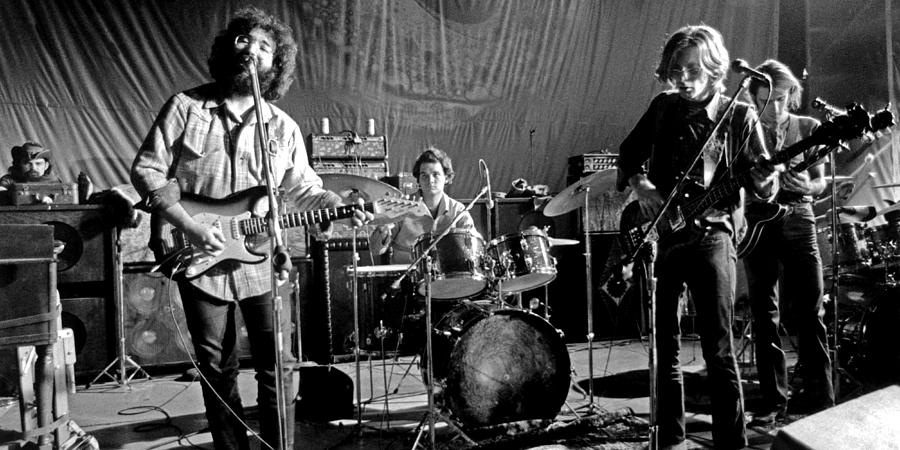When drummer Mickey Hart quit in early 1971 and organist/singer Ron “Pigpen” McKernan took some time off to deal with his failing health, the Grateful Dead found themselves pared down to their slimmest line up in years. Instead of breaking up or trying something new, they responded by getting back to basics. At least as much as they ever did, anyway.

The new Dave’s Picks release – Volume 26 for those keeping score – captures this slim, rockin’ version of the Grateful Dead.
With Bill Kreutzmann on drums, Keith Godchaux on piano, Phil Lesh on bass and both Jerry Garcia and Bob Weir on guitar, the band acquired a leaner, sparse sound. Gone were the lengthy, 20-minute plus jams, the extended drum duets and droning feedback. Instead, the band leaned into tight, country-tinged rock, with the occasional song opening up into improvisation, but always kept on a tight leash. It’s telling how here, only one of the songs it’s the ten-minute mark. Not long before, songs were taking up whole album sides!
The first two discs of this set comprise a complete show from Albuquerque on November 17, 1971, and show how much the group had changed from even a year before. It opens with “Truckin’,” which builds into Garcia trading licks with Weir, and a tasty solo, but one that only lasts for a couple of minutes and never gets too far outside the song’s groove. But in case you’d forgotten they were the Dead, “Sugaree,” opens with a false start:
“We’re new here,” jokes the band, before they launch into the song. Glad they kept the whole thing, warts and all.
Throughout the first disc, the band leans into old school country: Marty Robbins’ “El Paso,” Jesse Fuller’s “Beat It On Down the Line,” and Hank Williams’ “You Win Again.” But there’s also several originals: “Jack Straw,” “Deal,” and.”Cumberland Mine.” On all of these, Garcia’s playing is crisp, darting up and down his fretboard, but it’s Godchaux’s boogie piano which pushes the songs ahead: they’d shed the acoustic instruments from Workingman’s Dead, but kept it’s influences and vibe, and it makes for compelling listening.
For the best idea of what this era of the Dead was like, consider their version of “Playing in the Band.” Whereas later they’d stretch it out as far as they could, here it’s played relatively straight-ahead: Weir sings, Garcia plays some tasty, if restrained, lead guitar, and when the band hits the improv section, it has the rhythm section crashing around while Garcia and Godchaux trade licks. But the song wraps itself up neatly in just over six minutes; it’s practically a single edit!.
The boogie vibe continues through the second disc:
“One More Saturday Night” chugs along, picking up steam as it goes along, while “Sugar Magnolia” leads into a nice section where Garcia twists and turns while Godchaux bangs away on his piano in the background.
The real meat of the second disc, however, is the lone section where the bands goes into free-form: an extended “The Other One” suite. After Garcia leads into it, Kreutzmann takes a drum solo and the band leaps into the song. Things get a little spacey, with Garcia’s guitar slowly drifting into soft tones and band fading away, but it’s not too long before the rhythm section slowly works it’s way back in and the group comes down to Earth.
But after a speedy detour through the country-rock of “Me and My Uncle,” they reprise “The Other One” and launch into a powerful jam: the rhythm section crashes and pushes the band forward while Garcia and Godchaux run all over their instruments. It closes with a driving version of “Not Fade Away > Going Down the Road Feeling Bad > Not Fade Away,” where they deftly segue back and forth and chug along like a freight train. It’s a nice way to finish the set.
Since it was a relatively short gig, the third disc here is taken from a show a few weeks later in Ann Arbor.
By this point, Pigpen’s health had risen to where he could rejoin the band, and his electric organ adds another element to their sound. Most of this disc suggests alternate takes of songs elsewhere on the album: “Truckin’,” El Paso,” “Me and My Uncle.” There’s a few nice cuts they didn’t play in New Mexico: the slow country blues of “Loser,” or Pigpen’s turn at the mic on “Big Boss Man,” where his vocals starts off a little shaky, but turns in a nice harmonica solo. The band even launches into Chuck Berry’s holiday tune “Run Rudolph Run,” which is a natural fit for the group.
As the latest incarnation of their live archives series, the Dave’s Picks releases are only available in limited editions and usually sell out well before the release date. But with some luck, it’ll be available on streaming platforms before too long and on the secondary market. And while I don’t always dig too deep into these releases, this one does a good job of showing the early 70s Dead as a tight, energetic band. Within a few years, they’d be moving in a different direction and taking extended solos and long, exploratory jams. But here, they’re a lean, efficient rock band. If you can find a copy of Dave’s Picks Volume 26, it’s worth a listen.


